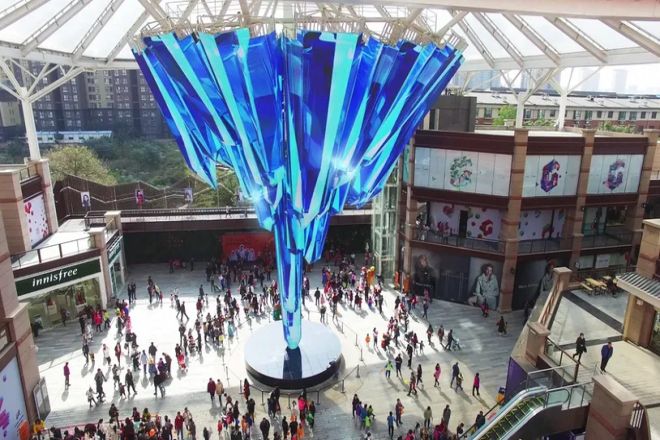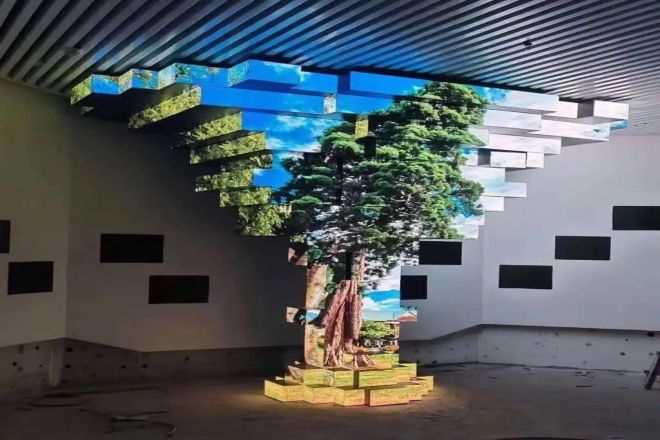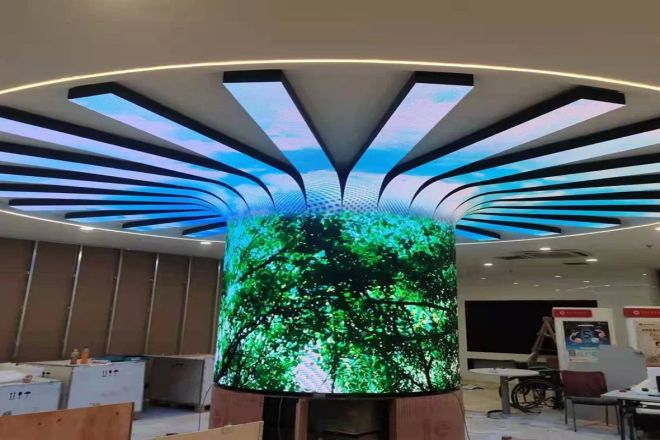介绍

随着科学技术的飞速发展, LED显示屏 technology has become an indispensable part of our daily lives and business activities.
From large outdoor billboards to indoor video walls to smartphones and wearable devices, LED displays have gradually become the leader in display technology with their advantages, such as high brightness, long life, and low power consumption.
However, in this rapidly changing and fiercely competitive market environment, creative LED displays are attracting more and more people’s attention with their unique visual experience and interactive functions.
1. Overview of current creative LED display technology
1). Basic principles and classification of LED displays
The basic principle of the LED display is to display diverse text, images, videos, and other content on the screen by controlling the brightness and luminous state of each LED lamp bead. LED displays are classified in various ways, mainly including the following types:
Dot matrix LED display: It is composed of many LED dot matrices arranged at equal distances. It is mainly used to display simple graphics such as text symbols, numbers, and letters.
Digital LED display: It adopts a 7-segment digital tube design and is often used for digital displays, such as counters, timers, etc.
全彩LED显示屏: It consists of three colors: red, green, and blue. It can display rich images, videos, and other content. It is widely used in outdoor billboards, stage backgrounds, and other occasions that require high-definition picture quality.
2). The main features and application areas of creative LED displays in the current market
The creative LED displays currently on the market have attracted widespread attention with their unique designs and diverse functions. Its main features include:
Design innovation: Creative LED displays adopt various customized shapes, such as spherical, arc, cylindrical, etc., to bring shocking visual impact to the audience.
Advanced technology: Advanced technologies such as Micro LED and transparent LED are used to improve display effect and interactivity.
应用范围广泛: not only used in traditional fields such as commercial advertising and media promotion, but also gradually expanded to diversified fields such as art exhibitions, educational interaction, and urban landscapes.
3). The main application areas of creative LED displays include
广告展示: Through creative styling and dynamic content, attract the attention of passers-by and improve advertising effectiveness.
Art Exhibition Hall: Provide audiences with immersive art experiences, such as LED Dream Cube, etc.
Educational field: Enrich teaching content and improve students’ interest in learning through interactive LED displays.
Urban landscape: As part of the city’s night scene, it enhances the city’s image and cultural atmosphere.
4). Some successful creative LED display cases
LED spherical screen: With its 360° full viewing angle and powerful rendering capabilities, it is widely used in exhibition venues such as museums and science and technology museums.
Ultra-fine pitch LED ultra-high-definition energy-saving cold screen: Provides high-definition picture quality and energy-saving and environmentally friendly use experience, and is widely used in conference rooms, education systems, etc.
LED folding screen: With its bendable and twistable characteristics, it provides a new visual experience for stage backgrounds, landscape decorations, etc.
These successful cases not only demonstrate the diversity and flexibility of creative LED displays but also provide important reference and inspiration for their future development.
2. Future development is driven by technological innovation

1). Display technology innovation
1.1). Breakthroughs and Applications of Micro LED Technology
- 技术突破:
Micro LED technology achieves a significant reduction in pixel spacing by reducing the size of the LED chip, resulting in higher pixel density and more delicate image performance. For example, Aledia has achieved microdisplay pixel pitches of just two microns, with nanowire diameters of about 0.15 microns.
- 应用前景:
Micro LED’s high brightness, high contrast, low power consumption, and other characteristics make it have broad application prospects in fields such as augmented reality (AR), virtual reality (VR), and wearable devices.
1.2). Further development and popularization of transparent LED displays
- 技术进步:
The transparent LED display has high transparency and good visual effects and can display information without obstructing the line of sight. With the continuous advancement of technology, the transparency, brightness, and color performance capabilities of transparent LED displays will be further improved.
- 应用扩展:
Transparent LED displays will be increasingly used in building curtain walls, commercial windows, public transportation, and other fields, bringing a new visual experience to urban landscapes and commercial advertising.
1.3). Innovation and application expansion of flexible LED displays
- 技术创新:
Flexible LED displays are made of flexible materials and can be bent and folded, breaking the shape limitations of traditional LED displays. With continuous innovation, the durability, stability, and reliability of flexible LED displays will be improved further.
- 应用扩展:
Flexible LED displays have huge application potential in automotive interior displays, wearable devices, electronic products, and other fields, providing more possibilities for future product innovation.
2). High resolution and high dynamic contrast
2.1). Analyze the development trends of 4K, 8K, and even higher-resolution LED displays.
As consumers’ requirements for visual experience continue to increase, high-resolution LED displays will become the mainstream of the market. 4K, 8K, or even higher resolution LED displays will provide clearer and more delicate picture quality to meet the audience’s pursuit of high-quality pictures.
2.1). Explore the impact of high dynamic contrast on improving visual experience
High dynamic contrast technology can significantly improve the black-and-white contrast and color gradation of the picture, making the image more vivid and lifelike. This will greatly enhance the audience’s visual experience, especially when watching movies, games, and other content, and can bring more shocking visual effects.
3). Intelligence and interactivity
3.1). Application of intelligent control system in the LED display screen
The intelligent control system can realize intelligent control and management of LED displays by integrating functions such as time timing, temperature adaptive adjustment, remote control, and automatic adjustment. This will improve the reliability and stability of the display while reducing labor costs.
3.2). Integration of interactive technologies such as touch screens and voice recognition in LED displays
Touch screen technology allows users to interact with content by touching the screen, and is suitable for information kiosks, self-service ordering systems, and other occasions. Speech recognition technology enables users to control on-screen content through voice commands, bringing users a more convenient interactive experience.
3.3). Integration of virtual reality (VR) and augmented reality (AR) technology with LED displays
By combining VR/AR technology with LED displays, it can bring users a more immersive visual experience. For example, in exhibitions, performances, and other occasions, audiences can wear VR/AR devices to watch content on the big screen, achieving a seamless connection with the virtual world.
3. Expansion and deepening of application scenarios
1). Commercial Advertising and Retail
1.1). Personalized display of creative LED displays in physical stores
Creative LED displays provide personalized displays for physical stores with their unique visual effects and interactivity. Capture your customers’ attention and increase your brand image and sales with dynamic images, videos, and interactive content.
1.2). Innovative applications such as virtual fitting rooms and interactive showcases
With the help of LED display technology, virtual fitting rooms and interactive showcases can be created to provide consumers with a new shopping experience.
Virtual fitting rooms allow customers to try on different styles and colors of clothing on the screen, while interactive windows use touch screens or voice recognition technology to allow customers to interact with the merchandise in the window and learn about product details and promotions.
2). Cultural entertainment and sports events
2.1). Application of LED display screens in large-scale events such as concerts and concerts
In large-scale activities such as concerts and concerts, LED displays are used as stage backgrounds or auditorium display devices, bringing stunning visual effects to the audience. Through high-definition picture quality, high dynamic contrast, and rich color performance, music, dance, and visual art are perfectly integrated to bring an immersive viewing experience to the audience.
2.2). Real-time interaction and audience participation of LED displays in sports venues
In stadiums, LED displays are not only used to broadcast game images and statistical data but also allow the audience to participate in the game through real-time interactive functions.
For example, viewers can vote, rate, or send comments for the teams or players they support through mobile applications or on-site touch screens, enhancing the audience’s sense of participation and belonging.
3). Smart cities and public information release
3.1). The role of LED display in smart city construction
LED displays play a vital role in the construction of smart cities. They are widely used in urban landscape, traffic management, public safety, and other fields to provide citizens with convenient information services and support for urban management.
For example, LED displays installed on both sides of urban roads can release traffic information, weather forecasts, public notices, and other content in real-time; LED displays installed in public places can display information such as urban culture and tourist attractions.
3.2). Real-time release of public information, such as public transportation and emergency notifications
LED displays play an important role in public transportation and emergency notifications. LED displays are installed at transportation hubs such as bus stations and subway stations to release bus arrival time, subway operation status, and other information in real time.
In emergencies, such as natural disasters or emergencies, LED displays can quickly announce emergency Notification and rescue information to guide citizens to evacuate and respond in an orderly manner.
4). Creative Arts and Design
4.1). Innovative application of LED display as an art medium
As an innovative art medium, LED display screens provide artists and designers with a broad creative space. They can take advantage of the unique properties and interactivity of LED displays to create colorful works of art and visual experiences.
For example, by using the dynamic effects and color changes of LED displays, installation artworks with strong visual impact can be created; by interacting with the audience, more vivid and interesting interactive artworks can be created.
4.2). How designers use LED displays to create unique visual experiences
Designers can achieve unique visual effects and interactive experiences through customized design and programming control of LED displays. They can select appropriate LED display types and specifications according to different application scenarios and creative needs and carry out precise size and shape designs.
At the same time, through programming to control the brightness, color, dynamic effects, and other parameters of the LED display, a more flexible visual effect and interactive experience can be achieved.
4. 挑战与解决方案

1). 技术挑战
1.1). The balance between cost and efficiency
- Challenge:
With the continuous innovation and upgrading of LED display technology, high-performance displays are often accompanied by higher manufacturing costs. Reducing production costs while ensuring display effects has become a major challenge for the industry.
- 解决方案:
Introduce advanced production technology and automation equipment to improve production efficiency and reduce labor costs.
Through technology research development and innovation, we optimize product design, reduce material waste, and reduce costs.
Seek strategic cooperation with upstream suppliers to ensure a stable supply of raw materials and cost control.
1.2). Challenges brought by rapid technological upgrading
- Challenge:
With the rapid development of technology, the replacement of LED displays is accelerating. How to quickly adapt to new technologies and trends has become the key to the survival and development of enterprises.
- 解决方案:
Strengthen technology research and development and innovation to keep pace with industry-leading technologies.
Establish a rapid response mechanism to promptly adjust product strategies and production plans to meet market demand.
Establish close cooperative relationships with universities, scientific research institutions, etc., to jointly promote technological progress and industrial upgrading.
2). 市场竞争
2.1) How to stand out in the fierce market competition
- Challenge:
The LED display market is highly competitive. How to stand out among many brands and become the first choice for consumers and customers is an important issue faced by enterprises.
- 解决方案:
Create a unique brand image and corporate culture, and improve brand awareness and reputation.
Provide customized and personalized services to meet the special needs of customers.
Strengthen marketing and brand promotion to improve product market share and competitiveness.
2.2). The importance of customization and personalized services
- Challenge:
As consumer needs become increasingly diverse and personalized, how to provide customized and personalized services that meet customer needs has become the key for companies to win the market.
- 解决方案:
Strengthen communication with customers and gain a deep understanding of customer needs and preferences.
Provide flexible and diverse product customization solutions to meet customers’ special needs.
Introduce advanced customized production technology to improve production efficiency and product quality.
3). Environmental protection and sustainability
3.1). Energy consumption and heat dissipation issues of LED displays
- Challenge:
Although LED displays have higher energy efficiency and lower energy consumption than traditional displays, as the display size and brightness increase, energy consumption and heat dissipation issues gradually become more prominent.
- 解决方案:
Use high-efficiency and energy-saving LED lamp beads and drive circuits to reduce the overall energy consumption of the display.
Optimize the heat dissipation design to improve the heat dissipation performance of the display and ensure stable operation.
An intelligent control system was introduced to automatically adjust the brightness and power consumption of the display based on ambient light and temperature.
3.2). Use of green materials and recycling of discarded displays
- Challenge:
With the widespread application and upgrading of LED displays, the problem of recycling and processing of waste displays has become increasingly prominent. The focus of the industry has become on how to reduce environmental pollution and resource waste.
- 解决方案:
Use environmentally friendly and recyclable materials to manufacture display screens to reduce environmental pollution and resource consumption.
Establish a complete waste display recycling and processing system to ensure that waste display screens are properly processed and utilized.
Strengthen environmental publicity and education to increase public awareness and attention to environmental issues.
结论
Looking to the future, creative LED displays will continue to lead the trend of display technology and bring us a more colorful, interactive, and convenient visual experience.
With the continuous advancement of technology and the increasing maturity of the market, we have reason to believe that creative LED displays will be applied in more fields and bring more convenience and fun to people’s lives.
如果您想了解更多关于LED显示屏的信息, 请与我们联系.
